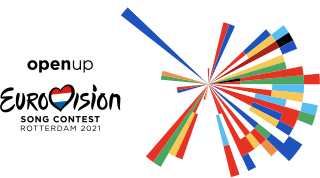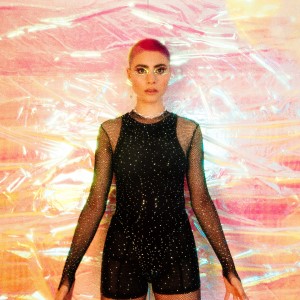
Australia has participated in the Eurovision Song Contest eight times since its debut in 2015 and has been in the top ten four times. It is the second country outside of the Eurasia region to take part in the contest since Morocco competed in 1980. The country's best result in the contest is a second-place finish for Dami Im in 2016. Australia also finished in the top ten in three of its other appearances in the contest, with Guy Sebastian finishing fifth in 2015, and both Isaiah and Kate Miller-Heidke finishing ninth in 2017 and 2019.
Australia debuted in the Eurovision Song Contest 2015 by invitation from the European Broadcasting Union (EBU) as a "one-off" special guest to celebrate the 60th anniversary of Eurovision. The country participated with the song "Tonight Again" written by Guy Sebastian, David Ryan Harris and Louis Schoorl. The song was performed by Guy Sebastian, who was internally selected by the Australian broadcaster Special Broadcasting Service (SBS) to represent that nation at the 2015 contest in Vienna, Austria. Sebastian was announced as the Australian representative on 3 March 2015 during a press conference in Sydney. The song Sebastian performed, "Tonight Again", was presented to the public on 16 March 2015. The Australian coloratura soprano of Armenian descent Mary-Jean O'Doherty also participated in the Eurovision Song Contest 2015 contest as part of the group Genealogy representing Armenia, but this marked the first time that the country has officially participated.
Australia participated in the Eurovision Song Contest 2016 with the song "Sound of Silence" written by Anthony Egizii and David Musumeci. The song was performed by Dami Im, who was internally selected by the Australian broadcaster Special Broadcasting Service (SBS) to represent that nation at the 2016 contest in Stockholm, Sweden. Im was announced as the Australian representative on 3 March 2016 during the Sydney concert of Conchita Wurst, Austria's Eurovision Song Contest 2014 winner. The song Im performed, "Sound of Silence", was presented to the public on 11 March 2016.
Australia participated in the Eurovision Song Contest 2017 with the song "Don't Come Easy" written by Anthony Egizii, David Musumeci and Michael Angelo. The song was performed by Isaiah Firebrace, who was internally selected by the Australian broadcaster Special Broadcasting Service (SBS) to represent that nation at the 2017 contest in Kyiv, Ukraine. Firebrace as the Australian representative and the song he performed, "Don't Come Easy", was announced and presented to the public on 7 March 2017 during an announcement event in Melbourne.
Australia participated in the Eurovision Song Contest 2018 with the song "We Got Love" written by Anthony Egizii, David Musumeci and Jessica Mauboy. The song was performed by Jessica Mauboy, who was internally selected by the Australian broadcaster Special Broadcasting Service (SBS) to represent that nation at the 2018 contest in Lisbon, Portugal. Mauboy was announced as the Australian representative on 11 December 2017. The song Mauboy performed, "We Got Love", was presented to the public on 8 March 2018.
Australia participated in the Eurovision Song Contest 2019 with the song "Zero Gravity" written by Kate Miller-Heidke, Keir Nuttall and Julian Hamilton. The song was performed by Kate Miller-Heidke. The Australian broadcaster Special Broadcasting Service (SBS) organised the national final Eurovision - Australia Decides in order to select the Australian entry for the 2019 contest in Tel Aviv, Israel. Ten artists and songs competed in the national final and the winner was selected by a public and jury vote.
Australia originally planned to participate in the Eurovision Song Contest 2020 with the song "Don't Break Me" written by Jessica Cerro, Anthony Egizii and David Musumeci. The song would have been performed by Montaigne. The Australian broadcaster Special Broadcasting Service (SBS) organised the national final Eurovision – Australia Decides in order to select the Australian entry for the 2020 contest in Rotterdam, the Netherlands. Ten artists and songs competed in the national final and the winner was selected by a public and jury vote.

The Eurovision Song Contest 2021 was the 65th edition of the Eurovision Song Contest. It took place in Rotterdam, Netherlands, following the country's win at the 2019 contest with the song "Arcade" by Duncan Laurence. The Netherlands was set to host the 2020 contest, before it was cancelled due to the COVID-19 pandemic. Organised by the European Broadcasting Union (EBU) and host broadcasters Nederlandse Publieke Omroep (NPO), Nederlandse Omroep Stichting (NOS) and AVROTROS, the contest was held at Rotterdam Ahoy, and consisted of two semi-finals on 18 and 20 May, and a final on 22 May 2021. The three live shows were presented by Dutch television presenters and singers Chantal Janzen, Edsilia Rombley and Jan Smit, and Dutch YouTube personality and make-up artist Nikkie de Jager.
Albania participated in the Eurovision Song Contest 2021 in Rotterdam, the Netherlands, with the song "Karma" performed by Anxhela Peristeri. Its entry was selected through the national selection competition Festivali i Këngës organised by Radio Televizioni Shqiptar (RTSH) in December 2020. To this point, the nation had participated in the Eurovision Song Contest sixteen times since its first entry in 2004. Prior to the contest, the song was promoted by a music video and various television and radio appearances in Albania, Greece, Kosovo and San Marino.
Greece participated in the Eurovision Song Contest 2021 in Rotterdam, Netherlands. Greek-Dutch singer Stefania was internally selected by the Hellenic Broadcasting Corporation (ERT) to represent the nation with the song "Last Dance", written by Dimitris Kontopoulos, Arcade, and Sharon Vaughn. Stefania was due to compete in the 2020 contest with "Supergirl" before that event's eventual cancellation.
Cyprus participated in the Eurovision Song Contest 2021 in Rotterdam, the Netherlands. The Cypriot broadcaster Cyprus Broadcasting Corporation (CyBC) internally selected Elena Tsagrinou as its representative with the song "El Diablo". "El Diablo" was written and composed by Thomas Stengaard, Laurell Barker, Oxa, and Jimmy Thörnfeldt. Cyprus performed 8th in the first semi-final of the Eurovision Song Contest 2021, held on 18 May 2021, and placed 6th, receiving 170 points. The entry qualified for the final held four days later, where the nation placed 16th with 94 points.
Georgia participated in the Eurovision Song Contest 2021 with the song "You" written and performed by Tornike Kipiani, who was internally selected in March 2020 by the Georgian broadcaster Georgian Public Broadcaster (GPB) to compete at the 2021 contest in Rotterdam, Netherlands after he was due to compete in the 2020 contest with "Take Me as I Am" before the event's cancellation. The Georgian entry, "You", was presented to the public on 15 March 2021.
Ireland participated in the Eurovision Song Contest 2021, having internally selected Lesley Roy as their representative with the song "Maps". She was due to compete in the 2020 contest with "Story of My Life" before the event's cancellation. "Maps" failed to qualify for the grand finale, placing last in the semi-final with 20 points.
San Marino participated in the Eurovision Song Contest 2021 in Rotterdam, the Netherlands. The Sammarinese broadcaster San Marino RTV (SMRTV) internally selected Senhit as their representative with the song "Adrenalina" featuring Flo Rida. Senhit was due to compete in the 2020 contest with "Freaky!" before the event's eventual cancellation and had also served as the nation's 2011 entrant. "Adrenalina" was written and composed by Thomas Stengaard, Joy Deb, Linnea Deb, Jimmy Thörnfeldt, Kenny Silverdique, Suzi Pancenkov, Malou Linn Eloise Ruotsalainen and Chanel Tukia, along with Senhit and Flo Rida themselves. While Flo Rida had provided vocals for the track, his participation in the performance of the song on the Eurovision stage was only confirmed on the day of the second semi-final due to COVID-19-related travel restrictions.
Austria participated in the Eurovision Song Contest 2021 with the song "Amen" written by Tobias Carshey, Ashley Hicklin and Jonas Thander. The song was performed by Vincent Bueno. On 26 March 2020, the Austrian broadcaster Österreichischer Rundfunk (ORF) announced that they had internally selected Vincent Bueno to compete at the 2022 contest in Rotterdam, the Netherlands after he was due to compete in the 2020 contest with "Alive" before the event's cancellation, while "Amen" was presented to the public on 10 March 2021.
Italy participated in and won the Eurovision Song Contest 2021. Italian broadcaster RAI announced in October 2020 that the winning performer(s) of the Sanremo Music Festival 2021, later turning out to be Måneskin with "Zitti e buoni", would earn the right to represent the nation at the Eurovision Song Contest in Rotterdam, the Netherlands. Måneskin eventually became the sixty-eighth winner of the Eurovision Song Contest and the first Italian entry to win the contest in 31 years. Italy received a total of 524 points, winning the public vote with 318 points and coming at fourth place in the jury vote with 206 points.
Malta participated in the Eurovision Song Contest 2021 with the song "Je me casse" written by Malin Christin, Amanuel Dermont, Nicklas Eklund and Pete Barringer. The song was performed by Destiny Chukunyere, who was due to compete in the 2020 contest with "All of My Love" before the 2020 event's cancellation. The song Destiny would perform at the Eurovision Song Contest, "Je me casse", was also internally selected and was released to the public on 15 March.
Sweden participated in the Eurovision Song Contest 2021 in Rotterdam, the Netherlands. Tusse represented the country with the song "Voices", following his victory in the national selection Melodifestivalen 2021 organised by Sveriges Television (SVT).

"Technicolour" is a song by Australian singer-songwriter Montaigne. The song represented Australia in the Eurovision Song Contest 2021 in Rotterdam, the Netherlands, after being internally selected by the national broadcaster Special Broadcasting Service (SBS). Montaigne co-wrote the song with songwriter and producer Dave Hammer. Montaigne stated that the song "makes you want to cry, makes you want to dance, makes you want to take on a malignant corporate power". The song did not qualify for the final.
Australia participated in the Eurovision Song Contest 2022 in Turin, Italy. The Australian broadcaster Special Broadcasting Service (SBS) selected Sheldon Riley with "Not the Same" to represent the country, after he won Eurovision – Australia Decides on 26 February 2022.


